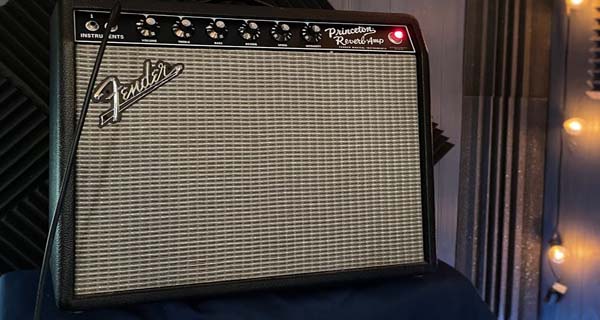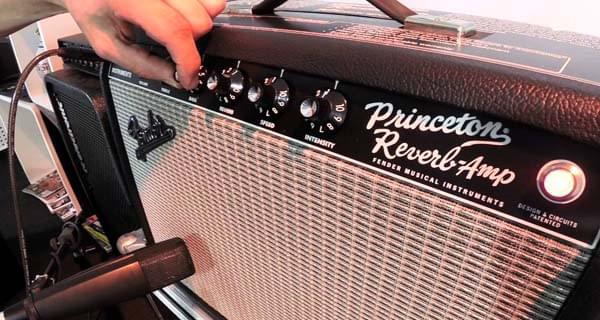Fender Princeton Reverb 65 Vs 68 [Which is Better Performing]
Fender never ceases to manufacture better versions of amps and Princeton Reverb is one of them. Talking of Fender Princeton Reverb amps, the 65 and 68 come with precision and a hell of amazing features.
If you have not checked them out yet, you should g through the comparison between Fender Princeton Reverb 65 Vs 68. Not that they have some big differences, yet Fender puts some special individual characteristics for the convenience of musicians.

The primal difference that starts the debate is their sound quality. Whereas Fender Princeton Reverb 65 comes with a crisp effect in its clean and sharp sound, the 68 comes with a beefy and dark tone. To learn more about them, stay with us. A comparison table will make you understand more conveniently.
# Table of Contents =>
Comparison Table:
| Features – | Fender Princeton 65 | Fender Princeton 68 |
| Sound Quality | Sharp and clean | Dark and sparkly |
| Headroom | Much cleaner | Less clean |
| Speaker | Jensen | Celestion |
| Loudness | Medium | High |
| Music Genre | Blues and jazz | Rock and heavy metal |
| Watt Power | 15W | 12W |
| Price | Very Pricy | Less Pricy |
Fender Princeton Reverb 65 & 68 Details:
People have to deal with a lot of things while buying an amp. It is because an amp decides how significantly the sound will be produced. Fender knows its duty and their Princeton Reverb series is made considering the crucial moments that a musician has to face. As one amp is different than the other in the whole Fender Princeton Reverb series, you’ve got to learn about their feature individually.
About the Fender Princeton Reverb 65 Amp –

Fender Princeton Reverb 65 is one of Fender’s wonderful tube amps because it has a nicer tone and trustworthy features. With a single Jensen C10R speaker, this amp produces a great sound indeed. There is a raspy flavor in the tone of the amp.
The edge of the sound is so sharp that you will feel delighted playing any music along with the amp. Because Fender Princeton Reverb 65 is an MIA, you will like it more. Besides, this amp is so much more appreciable when the speaker starts to break up the sound.
But the high volume takes too much time to break the sound. However, if you are less into bass use, then Fender Princeton Reverb 65 is the wise decision ever. The versatility of the amp is immense. With the 15-wattage power tube, you will get enough of this amp.
Things We Liked / Pros –
- Provides a very bluesy warmth sound with a crystal clear tone
- Comes with a Jensen speaker for the high pitch of the sound
- The power tube is worth 15 watts and runs at 8 ohms of resistance
- Perfect for home practices and fits in your recording studio too
Things We Didn’t Like / Cons –
- It is not perfect for gigs or large places
- A little bit pricy
About the Fender Princeton Reverb 68 Amp –

A lot of people ask for Fender Princeton Reverb 68 amp because of their tremendous controllability. From studio to gigs, you will find this amp excels in every type of music. However, for the beefy and creamy texture of the tone, the metallic musicians crave it the most.
This amp is MIM and that’s what makes it special to some extent. Besides, a Fender Princeton Reverb 68 carries a Celestion Ten 30 speaker. The flexibility of this amp with pedals is worth a mention. Because of this pedal-friendly feature, you can experiment with a lot of twisted sounds with it.
Also, the sound breaks easily while you use this amp, and that makes the tone finer big time. It carries the capability of reducing negative feedback too. However, it has low ends and some might feel the condition is too crucial at points. If you are more into bass, check out this magnificent amp. The 12 watts of power of the amp grasps the duty just fine.
Things We Liked / Pros –
- Provides a warm sound with a sparkly and creamy texture in the tone
- Produces enough volume to cover a gig or small-spaced room and a recording studio too
- With the dynamic response, the sound breaks up easily and produces interesting sound
- The 12-watt power tube of this amp excels in hard rock and heavy metal music genres
Things We Didn’t Like / Cons –
- You might not get an effective low-end sound at a high volume
Difference between Fender Princeton Reverb 65 Vs 68:
Fender manufactures a lot of brilliant amps and among them, most people talk about Fender Princeton Reverb weight, reissue, dimensions, and whatnot. However, the slight differences are important to observe to get the best service out of it. That is why we felt the urge of upholding the differences between Fender Princeton Reverb 65 and 68.
1) Sound Quality –

As we have already mentioned earlier that the sound quality is the primal difference between a Fender Princeton Reverb 65 amp and a 68 amp. You will not get the same tone in a Fender Princeton reverb 69 and a fender Princeton 65 solid state.
While the former provides more of a sharp edge with a spotless clear tone, the latter provides a warmer, beefy, and dark sound. Yet both sound quality of these amps is up to the mark.
2) Speaker Quality –
An amp without a quality speaker is not an amp at all. However, Fender takes care of that fact pretty considerately. We found that both Fender Princeton Reverb 65 and 68 amps carry a single speaker. But the Jensen speaker which the 65 one carries is more polished.
On the other hand, the Celestion Ten 30 speaker of Fender Princeton Reverb 68 lacks in quality to a little extent.
3) Music Genre –

As these two amps come with different sound qualities, you will definitely not going to play all the various types of music genres with only one of them. The Fender Princeton Reverb 65 amp, with its sharp edge and spotless tone, gets along with Blues and Jazz music genres pretty well.
On the other hand, the Fender Princeton Reverb 68 amp fits perfectly for heavy music genres like hard rock and heavy metals.
4) Loudness –
The Fender Princeton Reverb 68 amp wins in this race of loudness compared to the Fender Princeton Reverb 65 amp. If your band is based on loud music tone, then practice with the former one and you will not get disappointed. You might also have to turn the volume down at times to cope with the low-end characteristic.
5) Watt Power –
Fender offers different watt power to its different creations. Between Fender Princeton Reverb 65 and 68 amps, the former carries more wattage power. It comes with almost 15-watt power while the latter comes with 12-watt power. However, both have 8 ohms resistance.
6) Places to Use –
The Fender Princeton Reverb 68 amp is a go-to amp for small gigs. You can use it in the practice studio and in mid-ranged places too, thanks to its loudness. Conversely, the Fender Princeton Reverb 65 amp is not perfect for gigs and big places. It is just perfect for your recording studio.
So, Which one is better?
Both amps are more than capable. You can just take any of them or both and recreate your own music. However, if you play some specific genre, choose by their sound quality. For heavy metal players, choose Fender Princeton Reverb 68 amps. And if you play soft music like Blues and Jazz, go with the Fender Princeton Reverb 65 one.
Both Fender Princeton Reverb 65 vs 68 amps are worth a try. If you know your style of playing music, you can cope with any of them.
FAQs –
Question 1. Is the Fender Princeton 65 a good amp?
Answer: Fender Princeton 65 with its Jensen C10R speaker produces the most spotless sound ever. With the lightweight advantage, compact design, and vintage flavor, it is legit a good amp.
Question 2. How many watts is a 68 Princeton Reverb?
Answer: A 68 Princeton Reverb combo comes with 12 wattages of power. With this amount of power, the amp excels in its sector.
Question 3. Does 65 Princeton have a bright cap?
Answer: Yes, in most of the 65 Princeton Reverb amps there is a bright cap. But you won’t find it in a Fender Princeton 68 amp.
Question 4. What is the difference between Fender Princeton and Deluxe Reverb?
Answer: Basically, the Deluxe Reverb is the upgraded version of Fender Princeton. The former one is louder, carries extra tubes, and comes with more watt power than the latter one.
Last Updated on March 31, 2023 by Perry Garner


